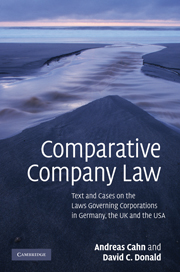 Comparative Company Law
Comparative Company Law Book contents
- Frontmatter
- Contents
- List of figures
- List of tables
- Preface and acknowledgments
- Glossary
- List of abbreviations
- Table of cases
- Table of legislation
- PART I The essential qualities of the corporation
- PART II The corporation and its capital
- PART III Governing the corporation
- PART IV Corporate combinations, groups and takeovers
- SUBPART A Mergers and acquisitions
- SUBPART B Companies in groups
- SUBPART C The market for corporate control
- 24 The regulation of takeover bids and prices
- 25 Management interference with takeovers bids
- 26 Special problems of leveraged buyouts
- References
- Index
26 - Special problems of leveraged buyouts
from SUBPART C - The market for corporate control
- Frontmatter
- Contents
- List of figures
- List of tables
- Preface and acknowledgments
- Glossary
- List of abbreviations
- Table of cases
- Table of legislation
- PART I The essential qualities of the corporation
- PART II The corporation and its capital
- PART III Governing the corporation
- PART IV Corporate combinations, groups and takeovers
- SUBPART A Mergers and acquisitions
- SUBPART B Companies in groups
- SUBPART C The market for corporate control
- 24 The regulation of takeover bids and prices
- 25 Management interference with takeovers bids
- 26 Special problems of leveraged buyouts
- References
- Index
Summary
Required reading
EU: Second Company Law Directive, art. 23
D: AktG, §§ 56, 57, 71a, 71d, 291 III, 308, 311
UK: CA 2006, secs. 677–683
US: Uniform Fraudulent Transfer Act, §§ 1–8
Using the target's assets to pay for the purchaser's plans
Introduction
What is a leveraged acquisition?
In Chapters 24 and 25, we looked at the regulation of takeover offers, focusing on required disclosure and the timing and scope of bids, as well as the actions that boards may take to block such offers. This chapter turns to the special problems connected with bids that are financed with debt, particularly debt secured by the assets of the target corporation or assumed by the target when it is merged into a successful bidder. Such a leveraged acquisition is usually referred to as a “leveraged buyout” or LBO, and has been defined as “a shorthand expression describing a business practice wherein a company is sold to a small number of investors, typically including members of the company's management, under financial arrangements in which there is a minimum amount of equity and a maximum amount of debt.” The debt is usually incurred, secured or assumed by the target company itself. As we have discussed at length in Chapter 6, the word “leverage” refers to an increase in the proportion of fixed obligations (here, debt) in the capital structure to maximize the stream of earnings per share of the equity interests.
- Type
- Chapter
- Information
- Comparative Company LawText and Cases on the Laws Governing Corporations in Germany, the UK and the USA, pp. 844 - 876Publisher: Cambridge University PressPrint publication year: 2010


